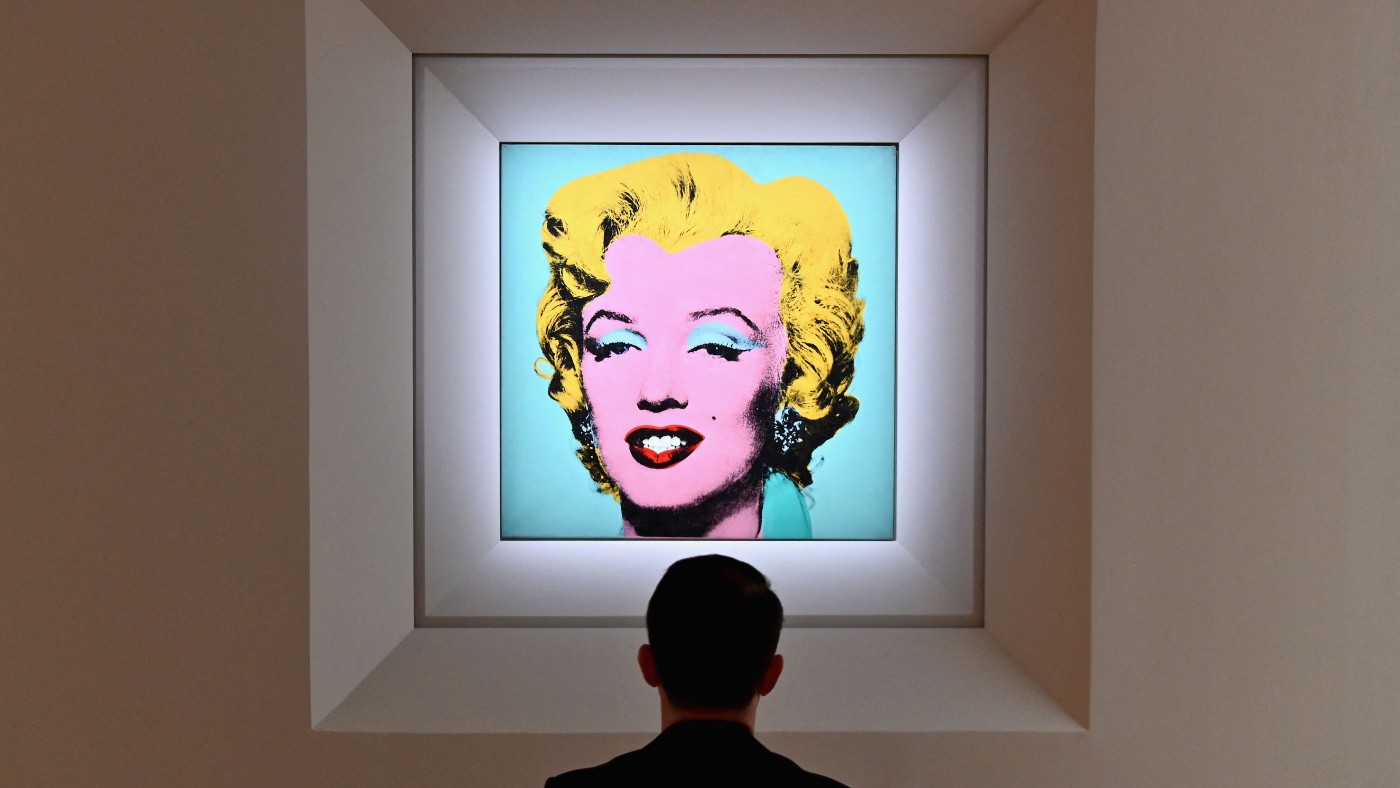Warhol’s Blue Marilyn breaks records: art investment market is ‘on a roll’
Art, like gold, can claim a history as ‘a store of value’, but big caveats apply

A free daily email with the biggest news stories of the day – and the best features from TheWeek.com
You are now subscribed
Your newsletter sign-up was successful
Blue Marilyn
This year’s spring auction season in New York was billed as a key test of the health of the art market, said DealBook in The New York Times – “an indication of whether top-quality trophies can continue to command high prices, no matter the instability of the world”. The “bellwether” work kicking off proceedings was Andy Warhol’s 1964 silk-screen of Marilyn Monroe, Shot Sage Blue Marilyn, which sold for $195m – breaking records as both “the highest auction price ever for an American artist” and the most expensive 20th century work. That was taken as a good omen, amid the current “surfeit of blue-chip art”. As Philip Hoffman of advisory firm The Fine Art Group observed, “there’s been a huge amount held back for two years, and there’s a huge amount of pent-up demand from new clients”. He reckons Manhattan’s two-week auction marathon could raise $2bn.
Four-minute wonder
The iconic Marilyn painting, one of a series of portraits Warhol made of the Hollywood star after her death in 1962, was sold “in just under four minutes”, said Waiyee Yip on Insider. Christie’s called it a tribute to Warhol’s “pervasive power”. The painting was bought by mega-dealer Larry Gagosian, who declined to say whether he was acting for himself or a client. But Asian bidding was notably “thin” throughout the sale, said Katya Kazakina on Artnet – “the Hong Kong salesroom was quiet when the Marilyn came up” and “Middle Eastern bidders didn’t seem to materialise either”.
Inflation hedge?
“Stocks, bonds and crypto are in turmoil. But more tangible assets are on a roll,” said Lex in the FT. An old football shirt – “admittedly worn by Maradona when he scored the world’s most memorable goal” – recently fetched over £7m. Art, like gold, can claim a history as “a store of value”. Indeed, Sotheby’s Mei Moses Index suggests that “over the long term” it has beaten inflation. But big caveats apply. Paintings are illiquid assets, prone “to more subjective impulses than gold or even houses”. With borrowing increasingly funding purchases, the art market has also benefited from low interest rates. Warhol’s Blue Marilyn might look like “the perfect kitschy inflation hedge”. But appearances can be deceptive.
The Week
Escape your echo chamber. Get the facts behind the news, plus analysis from multiple perspectives.

Sign up for The Week's Free Newsletters
From our morning news briefing to a weekly Good News Newsletter, get the best of The Week delivered directly to your inbox.
From our morning news briefing to a weekly Good News Newsletter, get the best of The Week delivered directly to your inbox.
A free daily email with the biggest news stories of the day – and the best features from TheWeek.com
-
 Switzerland could vote to cap its population
Switzerland could vote to cap its populationUnder the Radar Swiss People’s Party proposes referendum on radical anti-immigration measure to limit residents to 10 million
-
 Political cartoons for February 15
Political cartoons for February 15Cartoons Sunday's political cartoons include political ventriloquism, Europe in the middle, and more
-
 The broken water companies failing England and Wales
The broken water companies failing England and WalesExplainer With rising bills, deteriorating river health and a lack of investment, regulators face an uphill battle to stabilise the industry
-
 Currencies: Why Trump wants a weak dollar
Currencies: Why Trump wants a weak dollarFeature The dollar has fallen 12% since Trump took office
-
 Elon Musk’s starry mega-merger
Elon Musk’s starry mega-mergerTalking Point SpaceX founder is promising investors a rocket trip to the future – and a sprawling conglomerate to boot
-
 TikTok: New owners, same risks
TikTok: New owners, same risksFeature What are Larry Ellison’s plans for TikTok US?
-
 Will SpaceX, OpenAI and Anthropic make 2026 the year of mega tech listings?
Will SpaceX, OpenAI and Anthropic make 2026 the year of mega tech listings?In Depth SpaceX float may come as soon as this year, and would be the largest IPO in history
-
 Leadership: A conspicuous silence from CEOs
Leadership: A conspicuous silence from CEOsFeature CEOs were more vocal during Trump’s first term
-
 Ryanair/SpaceX: could Musk really buy the airline?
Ryanair/SpaceX: could Musk really buy the airline?Talking Point Irish budget carrier has become embroiled in unlikely feud with the world’s wealthiest man
-
 Powell: The Fed’s last hope?
Powell: The Fed’s last hope?Feature Federal Reserve Chairman Jerome Powell fights back against President Trump's claims
-
 Taxes: It’s California vs. the billionaires
Taxes: It’s California vs. the billionairesFeature Larry Page and Peter Thiel may take their wealth elsewhere